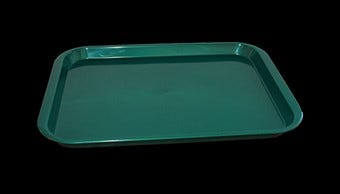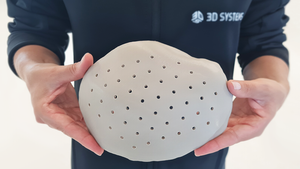Parx Materials’ tech that integrates zinc into polymers has a 99.9% or higher antimicrobial performance and is already being used by ZincIn for foodservice trays made from ocean plastic.
Technology that makes polymers resistant to bacteria, molds, and biofilm by making use of a trace element has been developed by Parx Materials, Rotterdam, The Netherlands. Inspired by the defense mechanism of the human skin in protecting against germs and viruses, that element is zinc. Parx Materials is integrating into polymers that are then have a 99.9% or higher antimicrobial performance of 99.9%.
Viruses do not multiply or proliferate on normal surfaces but can survive up to 2-3 days on plastic surfaces. Independent tests using ISO 21702 protocol for the Human Corona E229 virus proved that the Parx Materials technology has a significant effect against this virus — the technology reduces the virus five times faster than on normal solid plastic surfaces. The technology also brings down the H1N1 virus by 99.99% in just 8 hours in textiles fabricated with the technology.
The technology is claimed as the only effective broad-spectrum solution available not using toxic substances and that does not migrate and or compromise the material in any way. It is a said to be a true 100% safe and sustainable solution and with a high efficacy in preventing the adhesion and proliferation of bacteria and preventing biofilm formation on plastic surfaces. And it’s now also proves effective against viruses.
Parx Materials notes that virus tests were not executed with current Covid-19 causing virus as this is currently prohibited for commercial laboratories. But the E229 Coronavirus was selected as it has a good number of similarities to the Covid-19 virus.
Because of its unique characteristics, the technology can be used in almost any plastic surface creating a surface with an intrinsic resistance to bacteria, molds, fungi, biofilm, and viruses.
Tests conducted included ISO22196: Antimicrobial performance of plastic and non-porous surfaces.
Efficacy: 99.9% or higher versus Staphylococcus aureus, Staphylococcus epidermidis , Clostridium difficile, Listeria, MRSA, Streptococcus mitis, Streptococcus sangius, A hemolytic streptococcus, Escherichia coli, Salmonella, Acinetobacter baumannii, Pseudomonas aeruginosa, Enterobacter cloacae, Legionella pneumophila, and others.
Ocean-plastic-made foodservice trays with bacteria-resisting protection.
Parx Materials announced on May 25, a new kind of fast-food tray with hygienic properties made of plastic from an unusual source: Plastic ropes of discarded fishing nets. 
The tray’s special properties: Sanctioned third-party testing that follow international protocols show the specialized trays have greater than 99.9% less germs than standard trays.
ZincIn AS, Drammen, Noreway, is leveraging the advantages of these two concepts in launching hygienic food trays made from ocean waste.
Kjetil Christoffersen, founder of ZincIn, has been on the lookout for innovations and is a designer of products that make consumers’ life better, more ergonomic, and inspiring.
“Working with the Parx Materials antimicrobial technology sparked a whole new array of possibilities that can bring benefits and advantages to our lives,” he says. “Combining it with the Norwegian Plastic Recycling AS (NOPREC) recycled material that has served our food chain already before and now once again seemed a logical step.”
In the summer of 2017 NOPREC started up a new granulation line in a small town of Matmortua near the sea. Following startup testing test-running and fine-tuning, high-quality plastic raw materials have been produced from end-of-life farm cages, feed bags. and hoses from the aquaculture industry and ropes, plastic tanks, and other plastic waste from the fishing industry.
ZincIn AS will offer and distribute current and newly developed products containing Parx's unique technology. Inspired by the vision and product concepts of ZincIn, Parx Materials joined Christoffersen as a shareholder and board member in ZincIn, making it a strong alliance for the Scandinavian market and beyond, with more innovative products ahead.
The company reports that the first customer has already signed-up taking over 10,000 of these ocean waste hygienic serving trays.
About the Author(s)
You May Also Like




